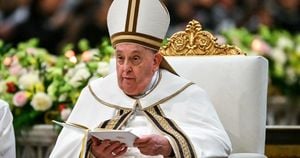Pope Francis remains hospitalized due to severe complications resulting from complex lung infections, yet the Vatican stresses he remains very much the pope. His health crisis has raised pressing questions about the governance of the Catholic Church should the pontiff become incapacitated.
Since entering Gemelli Hospital on February 14, 2023, Pope Francis has faced his most serious medical emergency to date. While reports indicate he experienced moments of calm, they also describe alarming details about his condition. After suffering from bronchitis which rendered him breathless, he was later diagnosed with pneumonia affecting both lungs and complicated by viral, bacterial, and fungal infections. On Saturday, he had to be administered high-flow oxygen and underwent blood transfusions following alarming lab results indicating low blood platelet levels.
Despite these challenges, the Vatican reassured the public through morning bulletins stating, "The night passed quietly, the pope rested." Reports have indicated the pontiff is conscious and alert, but he is still being monitored closely by medical professionals.
All eyes have been on the Vatican as it navigates the delicate situation surrounding the pope's health. Questions arise about what happens to church leadership if the pope were to lose consciousness or if he might, like Pope Benedict XVI, step down. According to canon law, there are no specific provisions for when the pope becomes incapacitated. Canon 412 outlines procedures for bishops unable to perform their functions; nevertheless, it does not extend to the pontiff.
Notably, during this time of uncertainty, Cardinal Pietro Parolin, the Vatican's Secretary of State, has taken on the daily operations of the church, continuing with planned events—an indicator, perhaps, of business as usual under the circumstances.
Francis's hospitalization has coincided with the church's preparations for the upcoming Jubilee year, with many officials moving forward with their duties. For example, Archbishop Rino Fisichella presided over Mass at St. Peter's Basilica, calling for prayers for the pope. Cardinal Baldassare Reina has also planned special Masses for Francis, inviting the global faithful to unite spiritually during this difficult time.
Meanwhile, among the wider Catholic community, bishops and laity worldwide have taken to social media to mobilize prayer campaigns and liturgical efforts for Pope Francis, reflecting the outpouring of concern from across the globe. Cardinal Timothy Dolan of New York expressed the somber reality many are facing: "We’re worried about him. I’m not afraid to admit it," alluding to the severity of the pope’s lung capacity issues at age 88.
To date, Francis has led the Catholic Church for over 12 years since becoming the 266th pope on March 13, 2013. His recent medical issues have amplified discussions on the need for clear guidelines concerning Papal incapacity. For years, there have been calls for clearer church laws governing scenarios when the pope cannot fulfill his duties, but the recent crises could provide additional impetus for movement on these discussions.
Christian communities are reminded of Francis's contributions and leadership during his 12-year tenure, and the possibilities of his resignation or incapacitation would undoubtedly mean significant changes within the church. Proposals by canon law experts exploring the possibility of declaring "totally impeded see" suggest it may one day be necessary for the College of Cardinals to take on governance duties when faced with similar situations.
Within the Vatican, there is heated debate about how to approach the pope’s potential incapacity. Experts noted the importance of having legal frameworks to maintain the unity of the church. Past precedents set by popes like Benedict XIV, who resigned due to incapacity, may offer guidance during this unnerving time.
Pope Francis’s reflections during his illness acknowledged the support he has received, stating, "I sincerely thank the doctors and health workers of this hospital for the attention they are showing me." These sentiments from the pope not only connect him with his care team but also with the global Catholic community as they maintain hope for his recovery.
The impacts of Pope Francis's health crisis rippled through the Vatican and beyond, ushering forward discussions on leadership structures within the church, engendering prayers around the world, and celebrating the 88-year-old leader's enduring legacy as he navigates this turbulent time.



